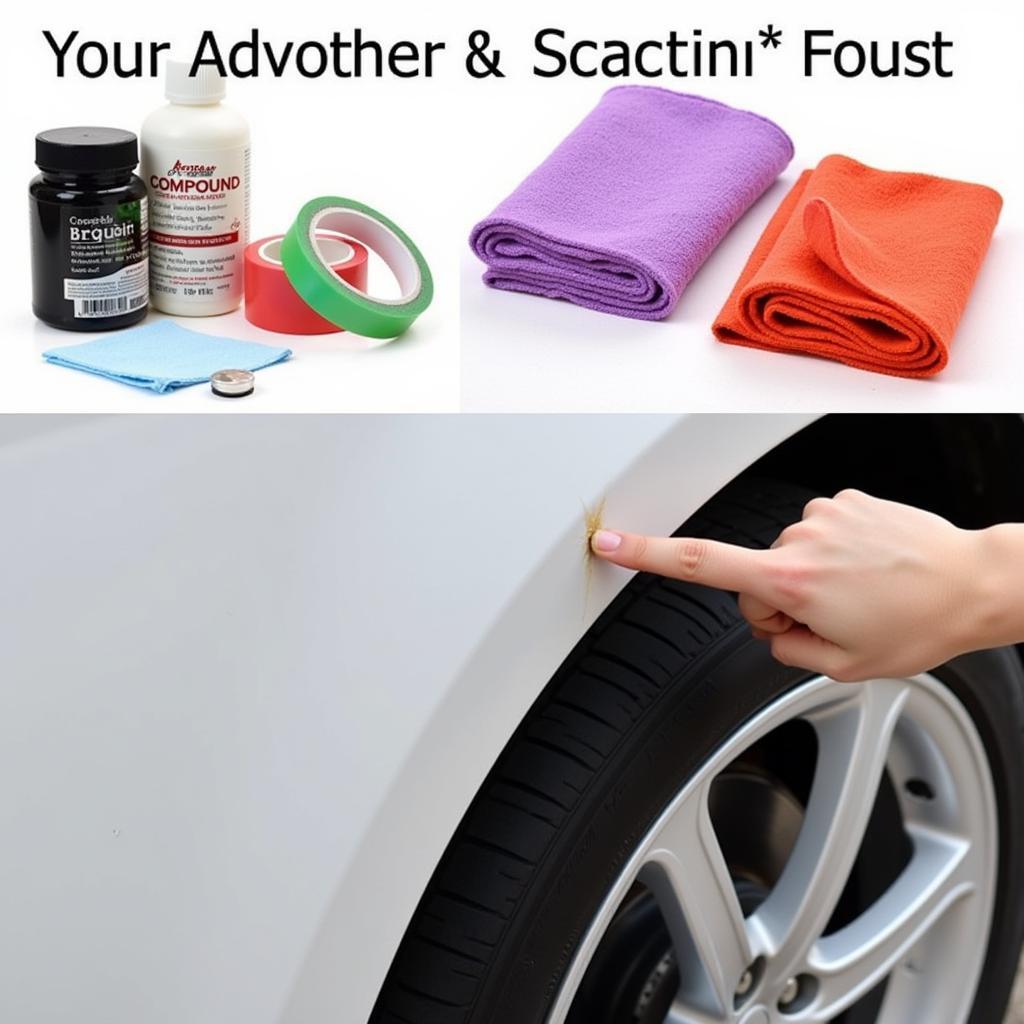Fixing minor scratches on your car can seem daunting, but with the right approach, you can restore your car’s finish without breaking the bank. This guide will walk you through the best way to fix small scratches on your car, from assessing the damage to achieving a professional-looking result.
 Fixing Small Car Scratches: A Step-by-Step Guide
Fixing Small Car Scratches: A Step-by-Step Guide
Identifying the Scratch Depth: Clear Coat vs. Deep Scratches
The first step in fixing a scratch is determining its depth. A scratch that only affects the clear coat is relatively easy to fix, while a scratch that penetrates the paint or primer will require more extensive repair. Run your fingernail across the scratch. If your nail catches, it’s likely deeper than the clear coat. Knowing the depth will determine the appropriate repair method. Did you know a deep scratch can lead to rust if left untreated?
How can you tell if the scratch is just in the clear coat? If your fingernail doesn’t catch on the scratch, it’s likely only in the clear coat and can be fixed with polishing. Deeper scratches will require more work. You might find articles like how to fix a small scratch on your car helpful for further understanding.
DIY Scratch Repair: Simple Steps for Surface Scratches
For clear coat scratches, a simple DIY approach can often yield excellent results. Here’s a step-by-step guide:
- Wash and Dry: Thoroughly wash and dry the affected area to remove any dirt or debris.
- Apply Rubbing Compound: Use a microfiber cloth to apply a small amount of rubbing compound to the scratch, working in circular motions.
- Buff and Polish: After the rubbing compound dries to a haze, buff it off with a clean microfiber cloth. Follow up with a polishing compound for a smooth, glossy finish.
- Wax for Protection: Apply a coat of wax to protect the repaired area and enhance the shine.
What if the scratch is deeper than the clear coat? For deeper scratches that penetrate the paint, you might need a touch-up paint pen or professional repair. Consider checking resources like cost to fix a small dent in your car for related information.
When to Seek Professional Help
While minor scratches can often be addressed with DIY methods, deeper scratches or those affecting larger areas might require professional attention. A professional auto body shop can perform more complex repairs, ensuring a seamless finish. They have the expertise and tools to match the paint perfectly and address any underlying damage.
“Ignoring a deep scratch can lead to rust and further damage. Addressing it promptly, whether through DIY methods or professional repair, is key to maintaining your car’s value,” says John Miller, an Automotive Engineer with over 20 years of experience.
Preventing Future Scratches
Prevention is always better than cure. Here are a few tips to help you protect your car’s finish:
- Regular Washing: Regular washing removes dirt and grime that can cause micro-scratches.
- Covered Parking: Parking in a garage or under a carport minimizes exposure to the elements and accidental scratches.
- Careful Handling: Be mindful of objects that could scratch your car, such as keys, bags, and branches.
For information on the cost of repairing other damages, you might find resources like cost to get speakers fixed in a car or cost to fix scratch on car door bike handle helpful. Sometimes, the damage might be more extensive than it appears. Knowing how much to fix body damage on a car can help you make informed decisions.
Conclusion: Maintaining a Scratch-Free Finish
Keeping your car free from scratches enhances its appearance and preserves its value. By understanding the best way to fix small scratches on your car, and taking preventative measures, you can maintain a pristine finish for years to come. Need help with your car’s scratches or other automotive issues? Don’t hesitate to contact us at AutoTipPro. Our number is +1 (641) 206-8880 and our office is located at 500 N St Mary’s St, San Antonio, TX 78205, United States.
“Remember, a well-maintained car reflects pride of ownership. Addressing even small scratches promptly can make a big difference,” adds Maria Sanchez, a seasoned Auto Body Technician.
FAQ (Frequently Asked Questions)
-
Can I use toothpaste to fix car scratches? Toothpaste is not a recommended solution for car scratches. While it might temporarily fill minor imperfections, it doesn’t offer a lasting fix and can potentially damage the clear coat.
-
What’s the difference between rubbing compound and polishing compound? Rubbing compound is more abrasive and used to remove deeper scratches in the clear coat. Polishing compound is finer and used to restore shine and smoothness after using rubbing compound.
-
How often should I wax my car? Waxing your car every 3-4 months provides a protective layer and helps maintain its shine.
-
Can I fix a deep scratch myself? While some deeper scratches can be addressed with DIY touch-up paint, severe scratches that penetrate the primer or metal require professional repair.
-
What is the average cost to fix a small scratch professionally? The cost of professional scratch repair varies depending on the depth and length of the scratch. It can range from $50 to several hundred dollars.
-
Is it necessary to fix small scratches immediately? While small, clear-coat scratches might not require immediate attention, it’s best to address them promptly to prevent dirt and moisture from accumulating and causing further damage.
-
What are the best products to use for DIY scratch repair? High-quality rubbing compound, polishing compound, and car wax are essential for effective DIY scratch repair. Consult your local auto parts store for recommendations.




Leave a Reply